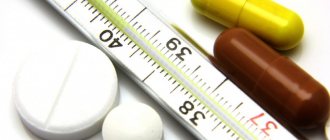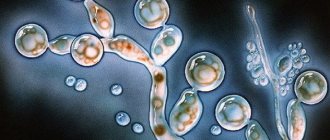Pancreatin is a medication that stimulates digestion. Prescribed to compensate for enzyme deficiency in inflammation of the pancreas and certain gastrointestinal diseases. During lactation, any medications are taken under medical supervision, and Pancreatin is no exception. Let's talk in more detail about how Pancreatin is prescribed during breastfeeding, and what the uncontrolled use of this drug leads to.
Composition of the drug
Pancreatin is an enzyme drug that normalizes digestion. The main component is the substance of the same name called pancreatin, which consists of 4 enzymes:
- Lipase.
- Alpha amylase.
- Trypsin.
- Chymotrypsin.
All pancreatic enzymes normalize digestion, and trypsin has an additional property and has an analgesic (pain-relieving) effect.
Pancreatin is available in the form of tablets in a protective coating. Thanks to the shell, the drug does not dissolve under the influence of hydrochloric acid in the stomach, but begins to work directly in the duodenum. The effect occurs after 30 minutes. – 45 min. after reception. The color of the shell depends on the manufacturer; it can be pink, yellow, brown or white.
Composition and dosage form
The drug is available in the form of tablets or capsules, coated with a special coating that protects the active element of the drug from the effects of stomach acid. The product is made in such a way that the therapeutic effect begins in the small intestine 20-30 minutes after consuming the tablets. Medicines contain the following substances:
- milk sugar;
- various dyes;
- microcrystalline cellulose;
- talc;
- macrogol;
- titanium dioxide;
- flint dioxide;
- sodium chloride;
- magnesium stearate;
- croscarmellose sodium;
- oidarit.
Mechanism of action
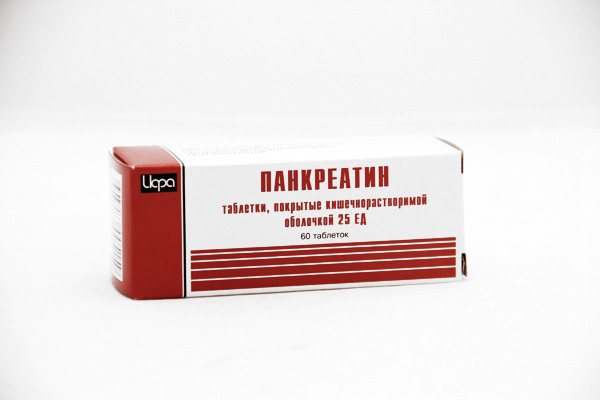
The main substance actually replaces the enzyme secretion produced by the pancreas. Pancreatin is responsible for the breakdown of protein and fats entering the digestive tract with food. With pancreatic dysfunction, a person experiences an enzyme deficiency, which is compensated for by Pancreatin. The mechanism of action of the drug is as follows:
- accelerates the breakdown of fats into glycerols;
- activates the digestion of protein to amino acids;
- promotes rapid absorption of carbohydrates;
- breaks down fatty acids to produce dextrins, starch to the state of monosaccharides.
Pancreatin enzymes are obtained from the secretions of domestic animals. In the human duodenum, the main substance starts and activates digestion. As a result, pain symptoms disappear, and the body better absorbs nutrients from food.
Purpose of the drug
Pancreatin should be taken in case of disruption of the exocrine function of the pancreas due to:
- chronic pancreatitis;
- dyspepsia;
- flatulence;
- intestinal infections;
- resection of the small intestine or stomach.
The medicine promotes faster breakdown of proteins into amino acids and stabilizes the process of food digestion in the gastrointestinal tract. The drug also inhibits stimulated secretion in the upper part of the small intestine, which produces an analgesic effect.
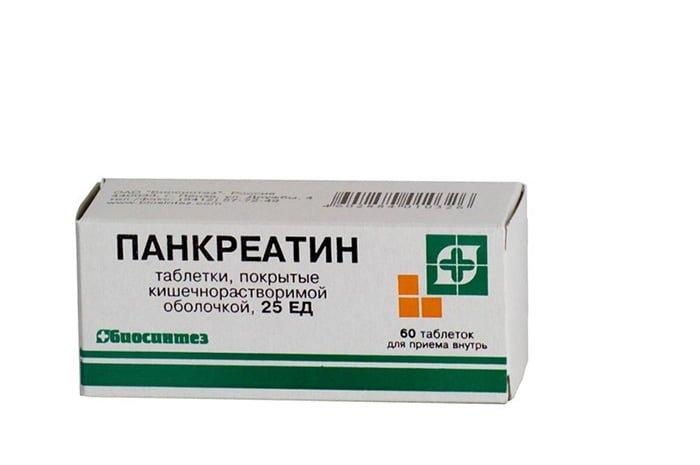
General indications
Indications for prescribing a pancreatin-based product are diseases associated with exocrine pancreatic dysfunction - pancreatectomy and chronic pancreatitis. In the complex treatment of achylia disease, in which the enzyme pepsin and hydrochloric acid are absent in the gastric secretion, Pancreatin is also the main medication.
As an adjuvant, it is prescribed in the treatment of the following diseases:
- dyspepsia;
- liver diseases;
- gallbladder pathologies;
- cystic fibrosis;
- resection (partial removal) of the intestine or stomach;
- flatulence.
The drug shows its effectiveness during rehabilitation therapy after radiation exposure. It is used to prepare patients for ultrasound of the abdominal organs and x-ray examination.
Pancreatin is taken once, in short-term and long-term courses. The decision on long-term use is made only by the attending physician, based on the results of the patient’s medical examination.
pancreatin during breastfeeding
First aid for poisoning
The article was published on January 31, 2012 in the category “For your health”
For a person far from medicine, all poisonings look the same: high fever, upset stool, frequent vomiting. But this is only at first glance, the opinion of a non-specialist. The cause of painful illness can be not only intestinal infections, but also other diseases with similar symptoms, for example, appendicitis, meningitis and even pneumonia. The sooner you seek help from a specialist, the better. Therefore, do not waste precious time, call a doctor. And what is especially important, do not self-medicate, do not take antibiotics, dietary supplements, vitamins, or other drugs, including potassium permanganate and activated carbon. All responsibility for actions as a result of which the patient’s condition worsens falls entirely on you.
While waiting for the doctor, do not panic. At this crucial moment you will have something to do. The task is as follows: provide first aid and provide competent care.
- Do not rush to lower the temperature if it does not exceed 38.5 degrees - this is a natural reaction of the body aimed at fighting germs. The use of antipyretic drugs is justified at higher temperatures, if previously the increase in temperature was accompanied by convulsions.
- Help the patient free himself from poisons. Start by cleansing your stomach. To do this, drink as much boiled water at room temperature as possible, rinse your stomach, and if necessary, induce vomiting 1-2 times. The fact is that vomiting and diarrhea during intestinal infections is a natural defense, in this way the body tries to cleanse itself of microbes and toxic products.
- Then take steps to cleanse your intestines of germs. This requires enterosorbent drugs that bind and remove not only viruses, but also toxins that poison the body. There is no significant difference between them. Remember: enterosorbents should be taken 1-1.5 hours before or after meals and other medications.
- To normalize digestive functions, you will need enzyme preparations - pancreatin, mezim forte and creon. I would especially like to note that preparations based on pancreatin with bovine bile components, such as festal, digestal, enzistal and others, as well as preparations with proteolytic action (abomin and some others) should not be used, because they can worsen diarrhea, which will lead to even greater dehydration, which will significantly complicate the patient’s condition. Be careful: strictly follow the dosages and manufacturer’s recommendations.
- During intestinal infections, the body loses not only water, but also minerals, sodium, potassium, and chlorine salts, which are necessary for the normal functioning of the cardiovascular system, brain, excretory system organs and kidneys. It is very important to prevent dehydration of the body and compensate for the loss of salts. With viral diarrhea (rotavirus, norovirus and other intestinal infections), it is the degree of dehydration that determines the severity and outcome of the disease. Therefore, from the very beginning, give the patient more than just water. For these purposes, specialists from ESPGAN (European Society of Gastroenterology and Nutrition) and WHO (World Health Organization) have developed new hypo-osmolar glucose-saline solutions for drinking . Unlike the drug rehydron, which is popular among the population, they not only prevent dehydration of the body, due to the phytocomponents contained in medicinal herbal extracts, glucose-salt solutions relieve inflammation, reduce spasms of the stomach and intestines, and alleviate the patient’s condition in general. It is advisable to have them in your home first aid kit, and definitely in the First Aid Kit for travelers with children.
If there are no saline solutions in the house, prepare it yourself. I'll give you a few recipes. They are used in case of poisoning to prevent dehydration of the body.
Sugar-salt solution recipe
- Boil 100 g of raisins or 500 g of diced carrots in 1 liter of drinking water.
- Add 1 tsp (without top) salt, 1/2 tsp. (without top) baking soda, 4 tsp. granulated sugar, bring to a boil. and cool - the homemade medicinal solution is ready.
- Cool, filter the solution from the pulp.
Another option for a homemade sugar-salt solution: for 1 liter of boiled water you will need 1 teaspoon of salt, half a teaspoon of baking soda and 8 teaspoons of granulated sugar.
Please note : homemade sugar-salt solutions are a temporary measure; to effectively help with poisoning and intestinal infections, ready-made medicinal solutions listed above are needed.
Intestinal infections can affect both children and adults, newborns and the elderly. The severity of the disease and subsequent recovery depend on several factors, such as:
- age of the patient - children under six years of age and elderly people over sixty are included in “risk groups” due to unformed or weakened immunity;
- the presence of concomitant diseases that complicate the treatment of infection;
- the presence, as well as the absence, of timely taken therapeutic measures, an accurately diagnosed diagnosis.
Unfortunately, children suffer from intestinal infections especially seriously, often with adverse consequences. For objective reasons, a child’s body is simply not able to resist numerous viruses. The fact is that only by the age of six do children develop immunity. If a child becomes lethargic, sleepy, his reactions have changed, or his body temperature has increased, this is a cause for concern. It is important not to miss the moment when a child gets sick and take the necessary measures. This will save his life.
Water regime for poisoning
How much fluid does a child need to drink?
- To avoid dehydration, the child should receive in the first day approximately as much fluid as a healthy baby of his age usually requires, plus the amount lost through vomiting and loose stools, which, according to WHO experts, is approximately 10 ml of fluid per 1 kg of weight baby for every bowel movement. The missing amount of nutrition (as a rule, appetite decreases during illness) must also be replaced with liquid.
- When feeding an infant, administer medicinal solutions from a spoon every 5-7-10 minutes. For example, 1-3 teaspoons or 2-3 sips through a pacifier. Do not give your baby a lot of liquid at once, follow the principle “better less, but more often.” For a child aged 2-3 years and older, the dosage of solutions per dose can be increased to 2-3 tablespoons, and the intervals between them to 10-15 minutes.
An infant should receive fluids that do not exceed the recommended volume. Exceeding it or feeding a baby (especially under the age of six months) only with rehydron can lead to undesirable consequences, including cerebral edema and death.
Diet for poisoning
There is such a principle - “do no harm,” so stick to it: feed the patient freshly prepared food, according to his desire, often and little by little. Remember, a full stomach provokes vomiting.
- It is desirable that the basis of the diet for intestinal infections should be therapeutic and prophylactic products enriched with bifidobacteria or lactobacilli.
- During the acute period of infection, older children and adults should exclude from the diet foods that cause fermentation and increased gas formation in the intestines, such as: whole milk and milk porridges, fermented baked milk and cream, black bread, meat, chicken and fish broths, products containing coarse fiber, dishes made from legumes, beans, peas, as well as beets, cabbage, remove grapes and citrus fruits, fatty and fried foods, canned food and preserves of animal and vegetable origin.
- It is advisable to refrain from eating sweets and completely eliminate any carbonated drinks and sparkling mineral water.
Menu for the little ones
- If your baby is breastfed, feed him in small portions at regular intervals, with a night break. For a short time, you can switch your baby to expressed milk if problems arise during breastfeeding.
- If the child is bottle-fed, replace the baby’s usual diet with adapted low-lactose or lactose-free formulas appropriate for his age, and also add unsweetened rice porridge with water or vegetable broth to the menu.
Important : feed your baby only freshly prepared food. Repeated heating of foods is extremely dangerous for children during intestinal poisoning. If food is contaminated, heating it, as well as storing it in the refrigerator, promotes the intensive proliferation of microorganisms. Enteric viruses remain viable in ice and can only be killed by boiling.
special attention : do not rush to fulfill any of his whims. The completely understandable desire of family and friends to please the unfortunate person usually leads to a deterioration in his health and subsequent hospitalization. Please be patient. Follow the recommended diet and hygiene rules.
The described activities are applicable to both children and adults; there are practically no differences, except for those described above. The sooner you provide first aid in case of poisoning, the more effective the treatment of the disease will be, which one will be determined by your doctor.
Your health is in your hands, provided they are clean. On measures to prevent “intestinal flu” in the cycle “Theory and Practice of Poisoning.”
With respect, readers of “Advice for Friends” Zima and Alexey Novokshonov, professor of infectious diseases, pediatrician of the highest category.
Contraindications
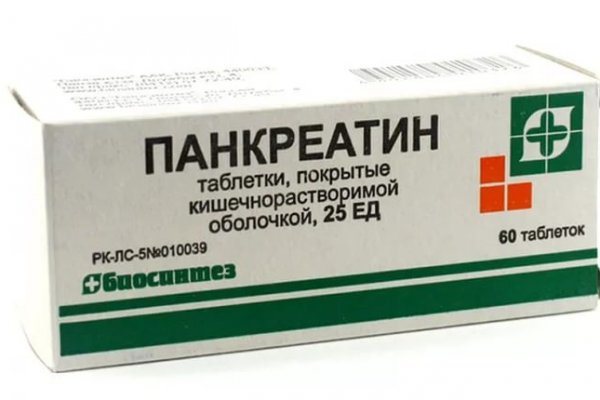
Pancreatin is not used if acute pancreatitis or exacerbation of its chronic form is diagnosed. Contraindications include hypersensitivity to the components of the medication, as well as age under five years.
In pregnant women and during lactation, it is used with caution, since a long course causes the accumulation of uric acid in the plasma and interferes with the absorption of iron, and there is a risk of developing anemia in the child and mother.
Application - instructions for nursing mothers
Often, digestive problems in nursing women begin during pregnancy. The reasons for their appearance are toxicosis, violation of the eating schedule, consumption of heavy and too fatty foods, abuse of one type of product, as well as displacement of the digestive organs at the end of pregnancy under the influence of the fetus.
Usually, digestive problems go away immediately after the birth of the baby, but it happens that the symptoms remain and become protracted. In this case, you need to consult a doctor.
Side effects
When using medicine, you need to know the possible side effects. Long-term use of the drug leads to a drop in the level of iron in the body, which must be replenished.
The body can lose the function of independently producing enzymes as a result of long-term use.
There are trade names for medications whose active ingredient is pancreatin. The most famous of them are creon, festal, mezim.
There are much safer methods to improve the functioning of the digestive system. Proper nutrition, adherence to food intake, and exclusion of excessively fatty foods from the diet can significantly improve the functioning of the body. The medicine is an emergency aid. Regular use can cause significant harm to health.
Increasing physical activity and regular walks in the fresh air help improve the digestion process. Proper drinking regime is of great importance. Include fermented milk products, mineral water, low-fat meat and vegetable broths in your diet. A decoction of flax seeds and oatmeal has a beneficial effect on the functioning of the digestive system. Including unprocessed oats in the diet can improve the functioning of the gastrointestinal tract and improve the condition of hair, skin, and nails.
A young mother should understand that any medication during breastfeeding must be prescribed by a doctor. Small healthy habits related to nutrition and physical activity can bring reliable, long-lasting results.
Indications for lactation
After the birth of a child, the reason for the malfunction of the gastrointestinal tract and the cessation of the production of enzymes by the pancreas becomes the need to follow a nursing diet. With the introduction of a diet, there is a sharp change in the diet and components of the daily diet.
Doctors also note the appearance of digestive tract ailments in breastfeeding women against the background of postpartum depression and a constant state of stress associated with the birth of a child.
Whatever the cause of the disease, a nursing woman is prescribed therapy, which may include enzyme preparations. Only a doctor can decide whether Pancreatin can be taken while breastfeeding. Before prescribing, the possible risks to the health of the infant are compared with the real benefits of taking the medication for the mother.
Alternative Medicines and Therapies
A nursing mother should pay attention to drugs that can replace Pancreatin:
- Creon.
- Festal.
- Penzital.
- Mezim, etc.
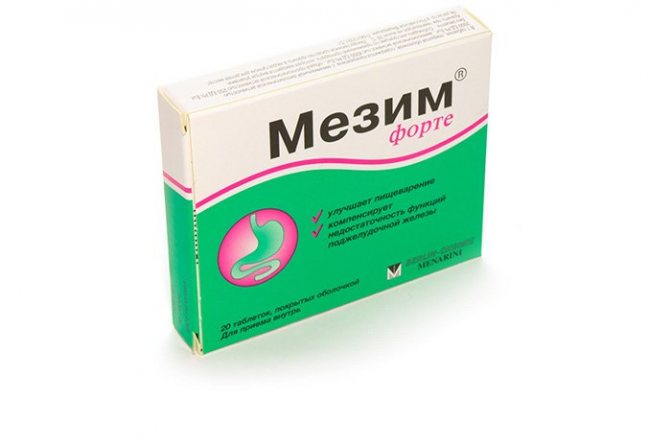
These drugs are also based on enzymes; they normalize digestion in case of enzyme deficiency. However, the cost of Pancreatin is lower than that of its analogues, and their therapeutic effect is practically no different.
You can normalize digestion using safe methods:
- Eat spicy, salty and fatty foods as little as possible.
- Drink at least 1.5 liters of purified water.
- Take daily walks outside for at least 4 hours.
- Eat natural yoghurts and other low-fat fermented milk products.
- Drink a decoction of flax fruits.
- Before breakfast, eat 25 g of crushed milk thistle seeds.
By following these rules, you can improve your digestion and metabolism. If your condition does not improve, then consultation with a gastroenterologist is necessary.
Thus, Pancreatin during breastfeeding is allowed to be taken during lactation after doctor's approval. In this case, the patient must follow the therapy regimen determined by the doctor. During the treatment period, it is recommended to follow a diet and lead a healthy lifestyle.
data-matched-content-rows-num=”9, 3″ data-matched-content-columns-num=”1, 2″ data-matched-content-ui-type=”image_stacked”
Rules of application
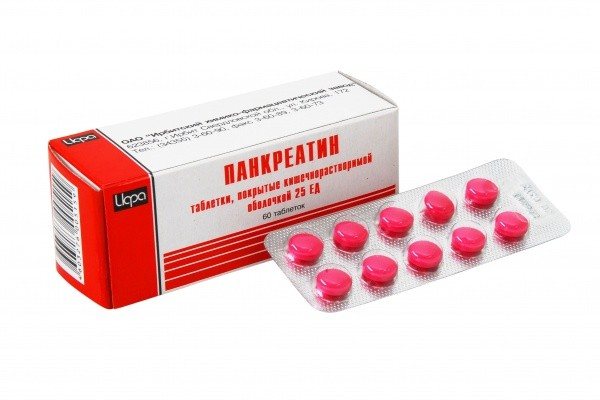
Pancreatin during lactation is prescribed in short courses. Before starting therapy, it is recommended to take Pancreatin tablets for 24 hours to check the baby's response to Pancreatin. If suspicious symptoms associated with digestion occur in a child, stop taking Pancreatin immediately.
The tablets are taken unchewed before meals. Drinking plenty of fluids is recommended during use. You can take the medicine with water, non-carbonated mineral water with an alkaline reaction, as well as juices (except grapefruit).
Indications and contraindications
When feeding or lactation, a young mother may be bothered by certain problems that necessitate the need to take auxiliary substances to establish the normal functioning of the gastrointestinal tract. These include:
- Inflammatory processes of the liver, stomach, gall bladder;
- Pancreatitis;
- Increased bloating, gas formation;
- Partial removal of the stomach, pancreas, as a result of surgery;
- Excessive consumption of fatty foods;
- As preparation for conducting surveys;
- Insufficiently active lifestyle.
The dosage and course of treatment are prescribed by a specialist. There are certain admission restrictions:
- Intolerance to the components of the drug;
- Hepatitis;
- Intestinal obstruction;
- With exacerbation of pancreatitis.
We recommend reading: Viferon during breastfeeding
A nursing mother should carefully monitor the baby’s reaction to taking the drug. The child may experience bloating, disruption of the digestive system, diarrhea, and problems with stool. The presence of any symptom is a reason to stop taking the medicine.
Side effects in baby and mother
As a rule, Pancreatin does not cause complications or side effects and is well tolerated by patients, including pregnant and lactating women.
When breastfeeding, side effects may occur in the baby by changes in stool, most often in the form of constipation, but in some cases diarrhea may also occur. An alarming sign is the appearance of regurgitation in the baby after eating, as well as an increase in the volume of secreted secretions. Intolerance to the drug in an infant may manifest itself as flatulence and bloating.
It should be noted that such phenomena are rare, and Pancreatin does not have a toxic effect through mother's milk. But if side symptoms occur, stop taking the drug immediately.
If a nursing mother is taking the drug, it is necessary to notify the pediatrician and the visiting nurse.

In a nursing mother, side effects appear due to individual intolerance to the drug in the form of nausea, changes in stool, intestinal obstruction, irritation in the anal area and discomfort in the epigastric area. In case of individual intolerance, the doctor selects an alternative enzyme agent.
With long-term use of the drug, the absorption of folic acid and iron decreases, which contributes to the development of anemia. Breastfeeding women are recommended to periodically undergo a medical examination and check the level of hemoglobin in the blood.
Digestive problems during lactation
Digestive disorders associated with a lack of enzymes occur during pregnancy. The uterus enlarges and puts pressure on the gastrointestinal tract, including the pancreas. As a result, the functioning of the organ that produces enzymes (enzymes) for better digestion and absorption of food is disrupted.
Due to compression of the esophagus, it is difficult for the contents to move through the digestive organs. This leads to the deterioration of the interaction of enzymes with food. Often, during lactation, chronic inflammation of the pancreas is diagnosed, and the woman is not even aware of the disease.
Digestive disorders during breastfeeding often occur due to the fact that the mother’s diet changes dramatically. That is, the problem can be caused by products that are unusual for a woman’s body. In addition, the functioning of the body (including the digestive system) is affected by hormonal changes.
A nursing mother should pay attention to the following symptoms:
- defecation disorders (constipation, diarrhea);
- excessive gas formation;
- bloating;
- allergies to certain foods;
- abdominal cramps;
- decreased appetite;
- nausea, vomiting.
The last 3 signs indicate an exacerbation of chronic inflammation of the pancreas. If several symptoms appear, you need to undergo a medical examination, after which the doctor will select an effective and safe medication. Treatment is often carried out with Pancreatin.
Analogs
Pancreatin is the main active ingredient of other drugs that help normalize digestion, the most accessible of which are:
- Pangrol 10000.
- Creon.
- Mezim Forte.
- Festal.
- Hermital.
Pangrol
Unlike Pancreatin, Pangrol is used to treat young children. Use with caution for pregnant and lactating women, although laboratory studies have not revealed any effect on the fetus, reproductive function or health of breast-fed children.
Creon
Indications for use coincide with the drug Pancreatin. Creon can be used for children under 4 years of age. The drug does not have a toxic effect on reproductive function and the fetus in pregnant women. The drug also does not affect the baby through mother's milk; the drug can be used under medical supervision in nursing women.
Mezim forte
Mezim has indications for use similar to Pancreatin. It has a higher cost, since the drug is imported from Germany.
Festal
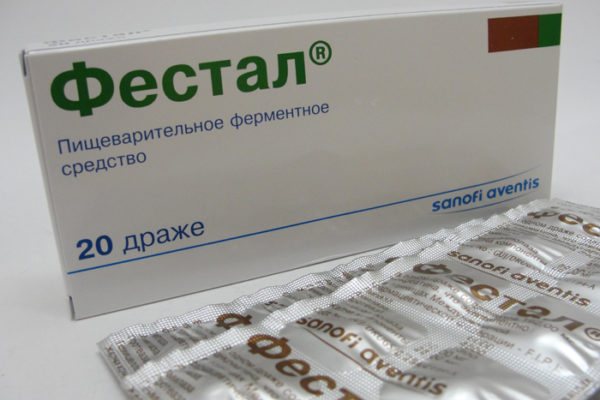
The drug is more complex in its composition, although the main active ingredient remains pancreatin. Festal is used in children only as prescribed by a doctor for complex liver pathologies and the cessation of production of enzyme secretions by the pancreas. During lactation and pregnancy, the drug is prescribed only if the benefit to the mother outweighs the possible harm to the health of the baby and the intrauterine development of the fetus.
Hermital
The composition of the drug is identical to Pancreatin and is not used in small children. Pregnant and lactating women are prescribed only after assessing the balance of benefit for the patient and harm to the fetus or infant.
Is it possible to take medication while breastfeeding?
Clinical trials of the drug have not been conducted on women who are breastfeeding. Experts still disagree on how exactly to take Pancreatin. Since the product is strictly prohibited for use by children under one year of age, it is necessary to follow special instructions for use for breastfeeding women.
There is no direct effect on lactation when taking the medication; during the course of treatment, you should follow the instructions for use of the drug for pregnant and lactating women.
The medicine is strictly prohibited for use by children under one year of age. When taking pills, a child may experience:
- gag reflexes;
- diarrhea;
- constipation;
- pain in the abdominal area;
- redness on the skin;
- small itchy rash.
If one of the symptoms occurs, consult a doctor and stop taking the drug.
You should take the pill only after the baby has been fed. At the time of treatment with the drug, you should carefully monitor the baby’s condition.
While using the product, you should adhere to proper nutrition:
- reduce the amount of fatty and fried foods you consume;
- drink plenty of fluids daily;
- reduce intake of solid foods;
- increase the number of meals, but reduce portion sizes;
- eat mostly warm food;
- eat steamed food.
Reviews and prices
Reviews of the drug Pancreatin left by nursing mothers are mostly positive. The drug helps well when taken once after a rich and varied meal during the holidays. When used in short-term courses, no negative effects on the child through milk and no side effects were noted.
Pancreatin is an inexpensive over-the-counter drug. Prices vary in the range of 25 - 75 rubles, depending on the packaging, which comes in 20 and 60 tablets, as well as on the manufacturer and region in which the drug is sold.
To summarize, we can say that a single dose or a short course of Pancreatin will not harm either the mother or the baby. Long-term use of the drug is possible only as prescribed by a doctor, if there are serious prerequisites for this. We hope you have found the answer to the question of whether a nursing mother can take Pancreatin.
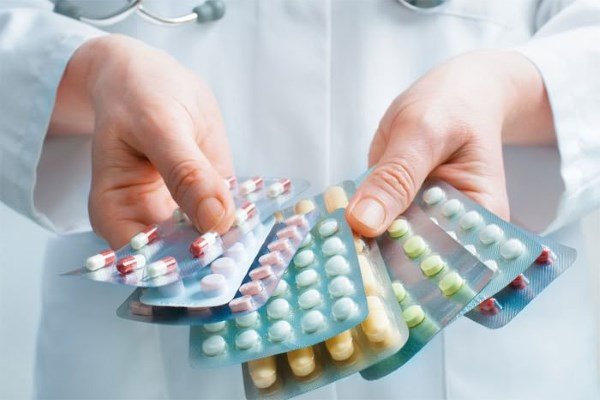
- Related Posts
- Is it possible to use Lugol while breastfeeding: indications for use during lactation
- About the benefits of motherwort during breastfeeding: how the product works, methods of use, contraindications and reviews
- Licorice root - is it possible or not while breastfeeding?
« Previous entry
Release forms of Pancreatin and its analogues
The modern pharmacological industry produces Pancreatin in the form of tablets, capsules or dragees with varying lipolytic activity - 10, 20, 25 thousand units Ph.Eur. The drugs are coated with an enteric coating, which allows enzymes to “reach” the intestines without damage.
Thanks to the increased dosage of enzymes in Pancreatin Forte, the patient can take fewer tablets, while maintaining the required amount of active substances. Pancreatin capsules are more often produced by foreign manufacturers. Pancreatin tablets are enteric-coated.
There are a great many analogues of Pancreatin that can be found in pharmacies today. All of them contain the active ingredient pancreatin, usually with increased lipolytic activity, as well as a number of auxiliary components.
But these substitute drugs, as a rule, are two or even several times more expensive than regular Pancreatin. In addition, their additional auxiliary components can theoretically cause allergic reactions. For example, Creon contains larger amounts of active substances than regular Pancreatin, which can lead to intestinal irritation.
Ermital is available in capsules Mezim Forte - the most popular analogue of Pancreatin in tablets Creon is sold in different dosages of the active substance





